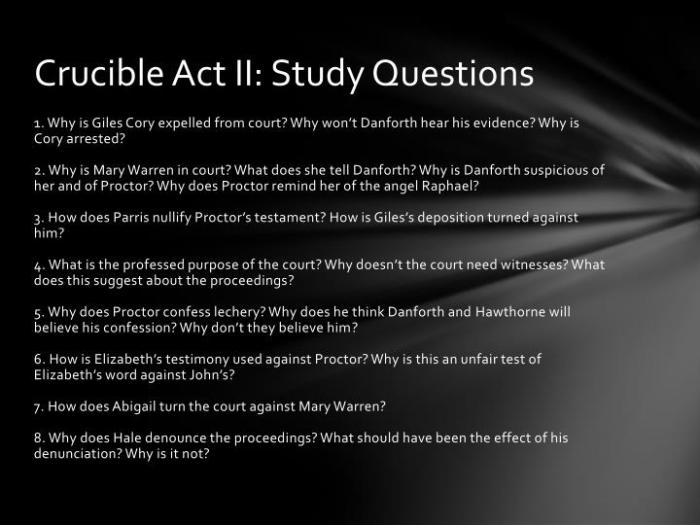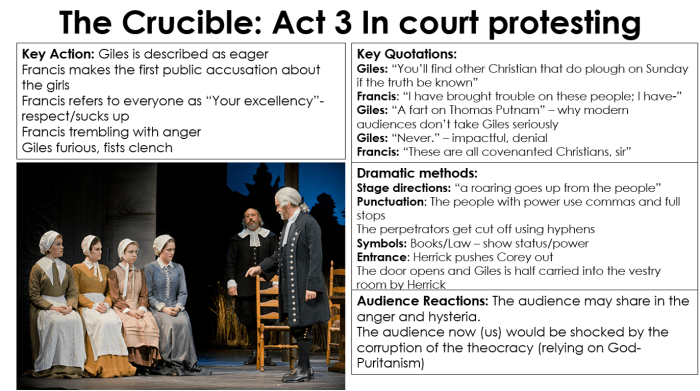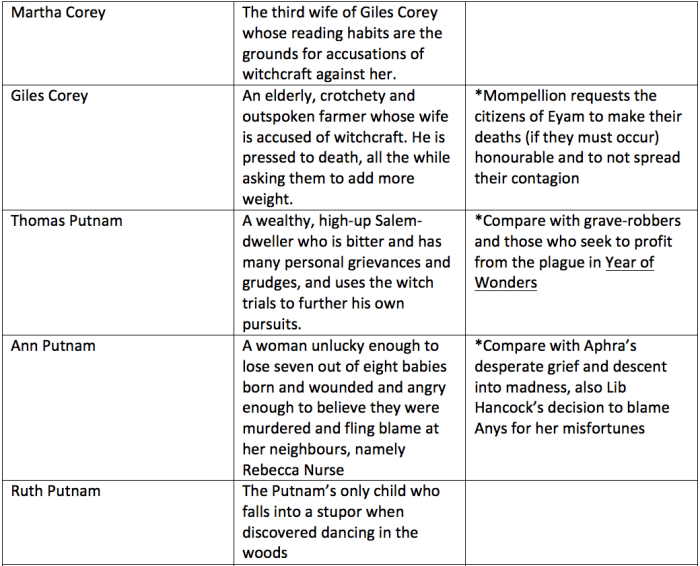The Crucible Act 3 Study Guide Questions delve into the heart of Arthur Miller’s gripping play, offering a comprehensive exploration of its themes, characters, and dramatic structure. This guide will illuminate the complexities of Act 3, providing insights into the motivations, conflicts, and consequences that shape the play’s narrative.
As the hysteria grips Salem, Abigail’s accusations ignite a firestorm that threatens to consume the community. John Proctor’s unwavering integrity is tested, while Abigail’s cunning and ambition drive her to manipulate the events. Giles Corey’s steadfast defiance becomes a symbol of resistance against the encroaching darkness.
Act 3 Summary: The Crucible Act 3 Study Guide Questions

Act 3 opens with the town in a state of chaos as Abigail’s accusations have spread like wildfire. John Proctor, who has been arrested, is brought before the court and confronts Abigail. He accuses her of lying and tries to expose her affair with Proctor, but his testimony is dismissed.
Meanwhile, Abigail and the other girls continue to accuse innocent people, leading to mass hysteria. Giles Corey, a farmer who has been accused of witchcraft, refuses to plead guilty and is crushed to death by stones.
The act ends with John Proctor being sentenced to death for witchcraft. As he is led away to be hanged, he declares, “I have given you my soul; leave me my name!”
Character Development in Act 3, The crucible act 3 study guide questions
John Proctor
In Act 3, John Proctor emerges as a tragic hero. He is a flawed character, but he is also a man of integrity and courage. He stands up for what he believes in, even when it means risking his life.
Abigail Williams
Abigail Williams’ character undergoes a significant transformation in Act 3. She becomes increasingly manipulative and ruthless, and she is willing to do anything to get what she wants. Her desire for John Proctor drives her to accuse innocent people of witchcraft.
Giles Corey
Giles Corey is a minor character in Act 3, but he plays an important role in the plot. He is a stubborn old farmer who refuses to plead guilty to witchcraft, even when it means being crushed to death. His death is a symbol of the injustice and tyranny that has gripped Salem.
Themes and Symbolism in Act 3
Mass Hysteria
Act 3 explores the dangers of mass hysteria. When people are caught up in a frenzy of fear and suspicion, they are capable of doing terrible things. The witch trials in Salem are a prime example of how mass hysteria can lead to injustice and violence.
The Dangers of Power
Act 3 also examines the dangers of power. Abigail Williams is a young woman who has been given a lot of power, and she uses it to manipulate and control others. Her actions show how power can corrupt even the most innocent of people.
The Conflict Between Good and Evil
Act 3 is a story of good versus evil. John Proctor represents good, while Abigail Williams represents evil. The conflict between these two characters drives the plot of the play and raises questions about the nature of good and evil.
Dramatic Structure and Language in Act 3
Dramatic Structure
Act 3 is a well-structured act that builds to a climax. The tension mounts as Abigail’s accusations spread and innocent people are arrested. The act reaches its climax when John Proctor is sentenced to death. The act ends with a sense of tragedy and despair.
Language
The language in Act 3 is powerful and evocative. Miller uses metaphor, imagery, and dialogue to create a vivid and memorable world. The play’s language also reflects the themes of the play, such as the dangers of mass hysteria and the conflict between good and evil.
User Queries
What is the significance of the fire imagery in Act 3?
The fire imagery symbolizes the destructive power of mass hysteria and the threat it poses to the community.
How does John Proctor’s character develop in Act 3?
Proctor’s unwavering integrity is tested as he faces pressure to confess to witchcraft. His refusal to compromise his principles leads to his arrest.
What is the role of Giles Corey in Act 3?
Corey’s defiance and refusal to participate in the witch trials become a symbol of resistance against the oppressive forces that have taken hold of Salem.

